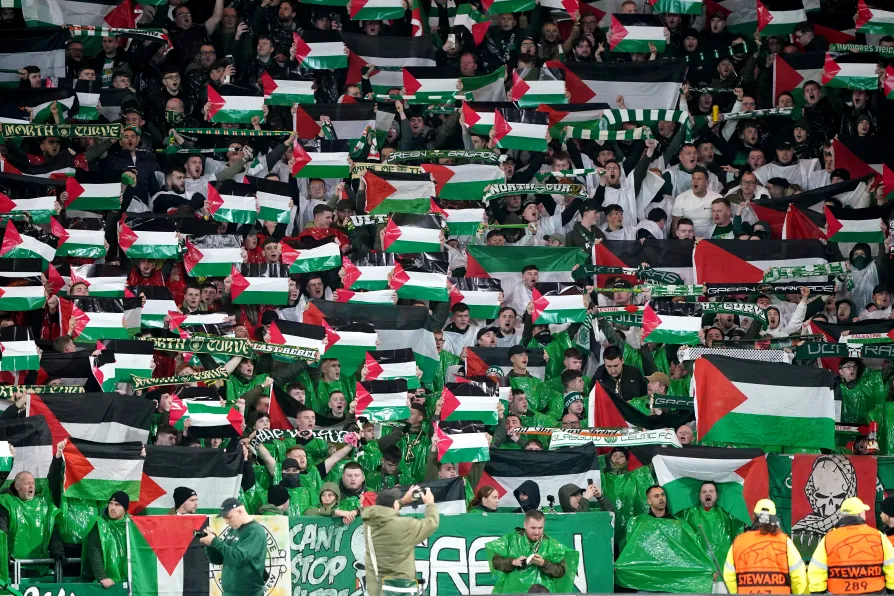Error message
An error occurred while searching, try again later.Palestinian football has been decimated, its players killed, its stadiums reduced to rubble. Yet the global game has looked away silent in the face of genocide, and will remain a stain on the sport, writes JAMES NALTON

 Celtic fans in the stands wave flags of Palestine during the UEFA Champions League Group E match at Celtic Park, Glasgow, October 25, 2023
Celtic fans in the stands wave flags of Palestine during the UEFA Champions League Group E match at Celtic Park, Glasgow, October 25, 2023
PALESTINIAN football has been razed to the ground. The infrastructure has been reduced to rubble, and stadiums no longer exist. Over 500 footballers have been killed in the region, which is likely a conservative estimate. Despite the scale of this catastrophe, the sport in general remains eerily silent on the issue.
Football has a reputation for coming together in moments of need, but that has not been the case for Palestine. There have been pockets of fervent solidarity and work done to raise funds for those affected, but it has often been done in isolation. There has been little to no mainstream, high-profile football-wide unity on this issue, and in many parts of the game, there has been no acknowledgement of the issue at all.
Even more shockingly, several footballers even backed the Israel Defence Forces (IDF), and received no sanctions for doing so. Meanwhile, Anwar El Ghazi was suspended by his club, Mainz 05, for showing solidarity with Palestine on social media. The club then terminated his contract in November 2023 before El Ghazi won a wrongful dismissal case in July 2024.
There have been no minutes of silence for the footballers killed in Gaza, no armbands and no gestures, for what they’re worth. If there have been, again, they have been done in isolation rather than organised by football as a whole.
In these pages at the back of the paper, we talk about this from the point of view of football, of sports, because that is our field, but this is a reflection of the wider destruction of Gaza and the genocide in Palestine committed by Israel, and the relative lack of reaction to it. It is happening to all of the people and workers in all sectors. More than 60,000 have been killed in Gaza, where there is now widespread starvation and famine.
Journalism is also known for its cross-genre solidarity among people working in the wider profession, but, again, the industry as a whole has been slow to show solidarity as Palestinian and Israeli reporters are killed.
The UN Human Rights Office has verified the killing of 227 Palestinian journalists in Gaza since October 7 2023, and there are numerous reports of Palestinian journalists being killed by the IDF before this date.
An extremely alarming apathy is developing due to a lack of mainstream solidarity, no doubt also due in part to the way some shows of support have been twisted to mean something else.
Many will be worried that what happened to El Ghazi will happen to them, and they don’t have the resources to fight back. When posting about this on social media, some people will respond privately with messages of support, but will not do so in the public domain or share the post.
It beggars belief that it has become controversial to show support for a region and a people that are being devastated in such a manner, but somehow this has become the case.
It has also been the case in stands at football matches, and many clubs around the world that might usually be considered “left-wing” or progressive have been unusually quiet.
In some leagues, bans on national flags unrelated to the game being played or players involved in it have been ramped up in recent years. It is a measure that has obviously been aimed at banning Palestinian flags, even though not explicitly saying as much.
Despite this, fans of some clubs have still managed to show support for Palestine, with Celtic and Paris Saint-Germain among the most high-profile teams to do so.
In a speech at the 75th Fifa Congress in Asuncion, Paraguay, on May 15, the vice-president of the Palestine Football Association, Susan Shalabi, highlighted numerous issues to football’s global governing body.
At this time, the Palestine FA has a clear request, which is “the removal of illegal settlement clubs on Palestinian territory from the Israeli leagues and immediate action against persistent racism and incitement to genocide within the Israeli football structure, which settlement clubs are an integral part of.”
Shalabi continued in her speech: “Let me remind you that all of this is happening against a background of football fields in Palestine being needlessly destroyed and used as detention camps for Palestinian civilians, including children.
“Meanwhile, Israeli football players in European clubs and the Israeli national team publicly called for the annihilation of Gaza.”
Banning national teams from playing in governing body-sanctioned competitive games and events is not always the answer, as it unfairly punishes generations of athletes from these nations through no fault of their own.
One nation has effectively wiped out football in another nation, but has not faced any sanctions for doing so.
Whatever happens from here, the past two years will remain a stain on the sport and those who run it, not just for a failure to condemn the perpetrator, but for a failure to show unreserved public support for the victims.










